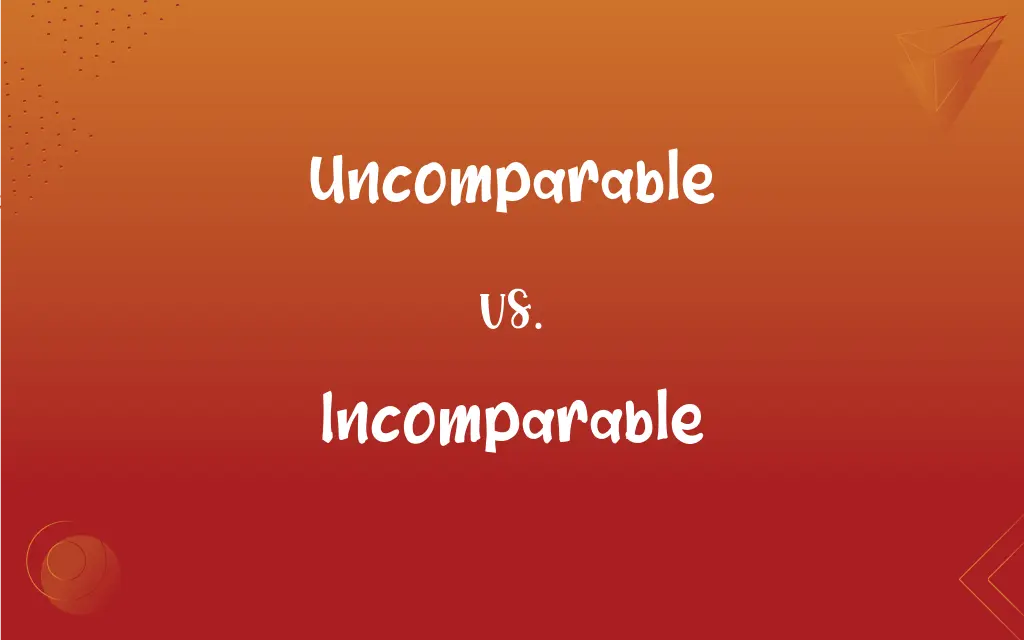Uncomparable vs. Incomparable: What's the Difference?
Edited by Aimie Carlson || By Janet White || Published on February 18, 2024
"Uncomparable" refers to something that cannot be compared due to lack of common qualities, while "incomparable" means having no equal or match in quality or extent.

Key Differences
"Uncomparable" is used when two entities cannot be compared because they have no common ground or basis for comparison. "Incomparable," on the other hand, implies that something is so unique or excellent that it has no equal.
The term "uncomparable" is less common and is typically used in contexts where comparing two items is not feasible. "Incomparable" is more widely used to express superiority or uniqueness that makes comparison irrelevant.
"Uncomparable" carries a neutral connotation, simply stating the impossibility of comparison. In contrast, "incomparable" often has a positive connotation, suggesting extraordinary quality or value.
In grammar, "uncomparable" is a straightforward negation, indicating the lack of comparability. "Incomparable," however, goes beyond negation to imply a level of excellence or uniqueness that sets something apart.
Sometimes used interchangeably in casual speech, "uncomparable" and "incomparable" have distinct meanings and should be used with precision to convey the correct implication in more formal or academic contexts.
ADVERTISEMENT
Comparison Chart
Definition
Cannot be compared due to difference
So unique or excellent, it has no equal
Usage Frequency
Less common
More common
Connotation
Neutral
Often positive
Implication in Comparison
Lack of common basis
Superiority or uniqueness
Grammatical Function
Simple negation of comparability
Implies exceptional quality or value
ADVERTISEMENT
Uncomparable and Incomparable Definitions
Uncomparable
Not suitable for comparison.
The climates of Mars and Earth are uncomparable.
Incomparable
Beyond comparison in quality or status.
Her singing voice is incomparable.
Uncomparable
Beyond the scope of comparison.
Ancient and modern technologies are uncomparable.
Incomparable
Unmatched or unparalleled.
The beauty of the Grand Canyon is incomparable.
Uncomparable
Incapable of being compared due to differences.
The experiences of different cultures are often uncomparable.
Incomparable
Without an equal or match.
His dedication to his work is incomparable.
Uncomparable
Lacking similarity for a meaningful comparison.
His abstract painting is uncomparable with traditional art.
Incomparable
Exceptionally good.
The taste of homemade food is incomparable.
Uncomparable
Not having common attributes for comparison.
The performance of a car and a bicycle is uncomparable.
Incomparable
So good as to have no equal.
His talent in mathematics is incomparable.
Uncomparable
Not able to be compared; not comparable.
Uncomparable
(grammar) Not comparable.
Uncomparable
Such that comparison is impossible; unsuitable for comparison or lacking features that can be compared;
An incomparable week of rest and pleasure
The computer proceeds with its incomparable logic and efficiency
This report is incomparable with the earlier ones because of different breakdowns of the data
FAQs
Are "uncomparable" and "incomparable" synonyms?
Not exactly; they have different meanings, with "uncomparable" focusing on the inability to compare and "incomparable" on uniqueness or excellence.
What does uncomparable mean?
It means not capable of being compared due to differences.
Can "uncomparable" refer to lack of standards for comparison?
Yes, it can imply that there is no common ground for comparison.
Is "uncomparable" often used in academic writing?
It's less common and usually used in contexts where direct comparison is not feasible.
What is the meaning of incomparable?
It refers to something so unique or excellent that it has no equal.
Does "incomparable" suggest superiority?
Yes, it often suggests that something is superior or unmatched in its qualities.
Is "incomparable" a compliment?
Yes, describing something as "incomparable" often implies it is exceptionally good or unique.
Can "uncomparable" be used for things that are completely different?
Yes, "uncomparable" is used when two things are so different that they cannot be compared.
Can "incomparable" be used for people?
Yes, it can describe a person's unique talents or qualities.
Can "uncomparable" imply incompatibility?
Yes, it can imply that two things are so different they are incompatible for comparison.
What is an example of "uncomparable" in a sentence?
"The economic systems of two different eras are often uncomparable."
How does "incomparable" enhance a description?
It emphasizes the exceptional nature or quality of something.
Is "incomparable" used in marketing?
Yes, it's often used to highlight the unique qualities of a product or service.
Does "uncomparable" have a positive or negative connotation?
It's generally neutral, simply indicating a lack of comparability.
Can "incomparable" be subjective?
Yes, what is considered incomparable can vary based on personal opinion.
Can "incomparable" be used in literary descriptions?
Absolutely, it's often used to describe scenes, characters, or emotions that are exceptionally vivid or unique.
What's a situation to use "uncomparable"?
When discussing two subjects that have no relevant basis for comparison.
Can "incomparable" refer to something unparalleled in history?
Yes, it can be used to describe something unprecedented or unmatched in historical context.
What is a key difference in usage between "uncomparable" and "incomparable"?
"Uncomparable" is used for things that can't be compared due to difference, while "incomparable" is used to describe something as having no equal due to its superior qualities.
Is "uncomparable" commonly used in everyday language?
It's less common and more specific to situations where comparison is not applicable.
About Author
Written by
Janet WhiteJanet White has been an esteemed writer and blogger for Difference Wiki. Holding a Master's degree in Science and Medical Journalism from the prestigious Boston University, she has consistently demonstrated her expertise and passion for her field. When she's not immersed in her work, Janet relishes her time exercising, delving into a good book, and cherishing moments with friends and family.
Edited by
Aimie CarlsonAimie Carlson, holding a master's degree in English literature, is a fervent English language enthusiast. She lends her writing talents to Difference Wiki, a prominent website that specializes in comparisons, offering readers insightful analyses that both captivate and inform.































































